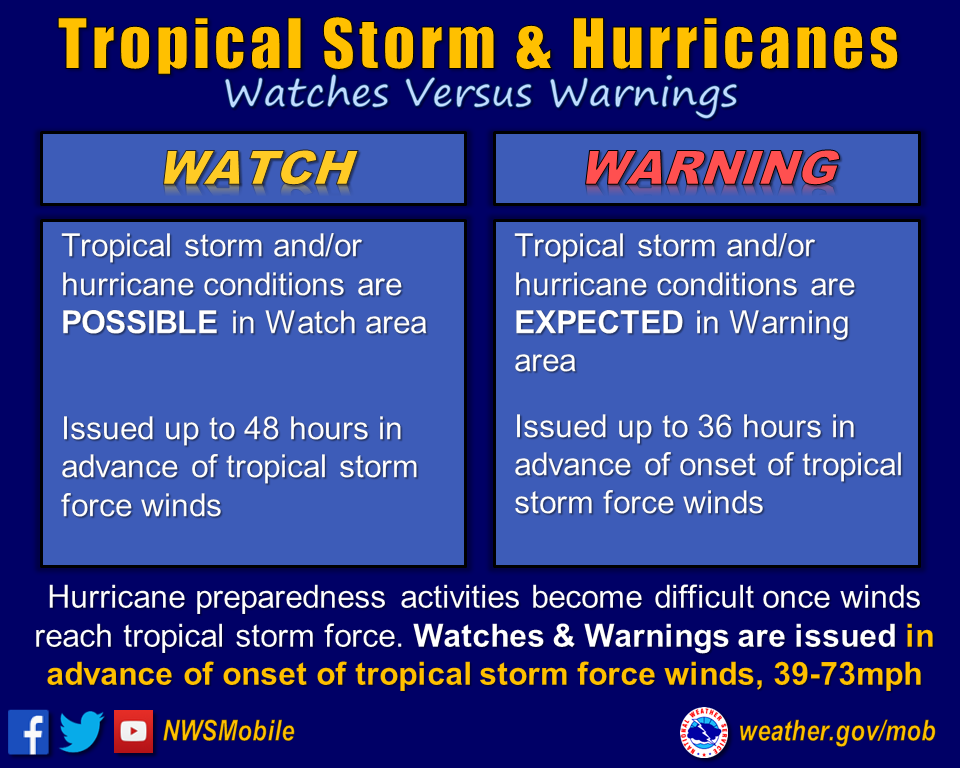Hurricanes are severe storms with sustained winds of 74 miles per hour or higher. Tropical storms are another type of severe weather with sustained winds of 39 to 73 miles per hour. In advance of these types of storms, experts will announce hurricane watches and warnings to prepare people for severe weather.

Atlantic Hurricane Season is June 1 – November 30: Sign-up for National Weather Service alerts or download the FEMA app for real-time alerts.
Plan Ahead
Before hurricane season starts, make sure your family has a plan, don’t forget to:
- Include your pets if you have them
- Include any locations you or your family spend a lot of time such as work, daycare, school, or any other frequent locations
- Prepare an emergency supply kit and keep it up-to-date
- Sign up to receive alerts to ensure you get the most up-to-date information
- Make sure insurance policies and personal documents are up to date and make digital, password-protected copies whenever possible
Before a hurricane
If your area is in the projected path of a hurricane, start preparing early. It is always better to be over prepared than underprepared in the case of a weather emergency!
- Check over your emergency plan to make sure it is up to date and that all family members are aware of and understand the plan
- Practice your emergency plan, especially if you have small children
- Check your emergency kit, and gather additional supplies that may be needed during or after the hurricane
- Food and water supply
- Medicine supply (make sure to have enough supply of prescription medications in case you are unable to get to a pharmacy quickly)
- Emergency power sources (ex: flashlights, backup charging devices, generators, extra batteries)
- Make sure to have important documents, such as medical documents and personal identification, with your emergency supplies in case evacuation is needed
- Keep cell phones and devices charged in case of power outage
- Prepare your home
- Declutter drains and gutters
- Move outdoor furniture inside
- Prepare your car
- Fill up with gas in case an emergency evacuation is needed
- Move vehicles into the garage or under cover whenever possible
- Keep an emergency kit in your car
- If you don’t own a car, consider making plans with a family, friend, or neighbor for transportation in case of an emergency evacuation
- Monitor local news channels to see if sandbags are being distributed or if additional preparations are being recommended for your area
- If flooding is expected, view our Flood Preparedness page for more information
During a hurricane
Always listen to authorities regarding whether you should evacuate or stay at home. If a hurricane is coming, you may hear an order from authorities to evacuate (leave your home). Never ignore an order to evacuate. Even sturdy, well-built houses may not hold up against a hurricane. Staying home to protect your property is not worth risking your health and safety. If driving conditions are dangerous, staying at home might be safer than leaving.
- If you are evacuating:
- Make sure to grab your emergency supply kit and anything that you really need to have with you (medications, important personal documents, cell phone, chargers, identification, and cash)
- If you have time, unplug appliances, turn off gas, electricity, and/or water
- Follow the roads that emergency workers recommend, even if there is traffic
- Don’t take alternate routes as they may be flooded, covered in debris, or washed out
- Do NOT drive through flooded areas
- If you are staying home:
- Make sure your emergency supply kit is easily accessible
- Listen to the radio, local news, TV, or follow local social media channels to stay up to date on the latest news and guidance
- Stay inside, even if it looks calm – wait until you hear or see an official message that the hurricane is over
- Stay away from windows – you could get hurt by pieces of broken glass or flying debris during a storm
- Stay in a room with no windows, or go inside a closet
- Be ready to leave – if emergency authorities order you to leave or if your home is damaged, you may need to go to a shelter or a neighbor’s house
After a Hurricane
The storm might be over, but that doesn’t mean the danger is. Keep your loved ones safe after the storm by following safety tips and local guidance.
- Avoid flood water – Turn Around. Don’t Drown.
- Do not use wet electrical devices
- Use flashlights instead of candles to avoid risk of fire
- If using fuel-burning equipment such as a generator or camp-stove, be sure to use it outside and away from windows to prevent carbon monoxide poisoning
- If your home is damaged or you hear shifting or abnormal noises, leave the building
- Drink safe water and eat safe food
- Throw away any foods that may not have been refrigerated properly due to power outages
- Throw away any foods that may have come into contact with flood water.
- Listen to reports from local officials on water precautions or for any instructions on sanitizing water if necessary
- In the event of a storm surge, residents and businesses who obtain drinking water from an individual well that is not protected by a floodproof cap are advised to disinfect their wells if they know or suspect that flood waters have entered and contaminated their systems.
- Document any property damage with photographs – contact your insurance company for assistance